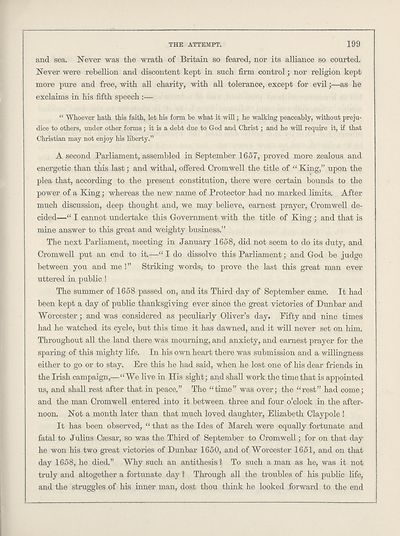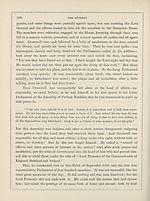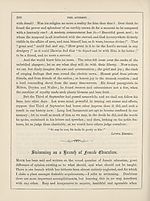Download files
Complete book:
Individual page:
Thumbnail gallery: Grid view | List view

THE ATTEMPT.
199
and sea. Never was the wrath of Britain so feared, nor its alliance so coni"ted.
Never were rebellion and discontent kept in such firm control; nor religion kept
more pure and free, with all charity, with all tolerance, except for evil;—as he
exclaims in his fifth speech :—
" Whoever hath this faith, let his form be what it wiU ; he walking peaceably, without preju¬
dice to others, under other forms ; it is a debt due to God and Christ ; and he wiU require it, if that
Christian may not enjoy his liberty."
A second Parliament, assembled in September 1657, proved more zealous and
energetic than this last; and withal, offered Cromwell the title of " King," upon the
plea that, accordiag to the present constitution, there were certain bounds to the
power of a King; whereas the new name of Protector had no marked limits. After
much discussion, deep thought and, we may believe, earnest prayer, Cromwell de¬
cided—" I cannot undertake this Government with the title of King ; and that is
mine answer to this great and weighty business."
The next Parliament, meeting in January 1658, did not seem to do its duty, and
Cromwell put an end to it.—" I do dissolve this Parliament; and God be judge
between you and me !" Striking words, to prove the last this great man ever
uttered in public !
Tlie summer of 1658 passed on, and its Third day of September came. It had
been kept a day of public thanksgiving ever since the great victories of Dunbar and
Worcester; and was considered as peculiarly Oliver's day. Fifty and nine times
had he watched its cycle, but this time it has dawned, and it will never set on him.
Throughout all the land there was mourning, and anxiety, and earnest prayer for the
sparing of this mighty life. In his own heart there was submission and a willingness
either to go or to stay. Ere this he had said, when he lost one of his dear friends in
the Irish campaign,— "We live in His sight; and shall work the time that is appointed
us, and shall rest after that in peace." The "time" was over; the "rest" had come;
and the man Cromwell entered into it between three and four o'clock in the after¬
noon. Not a month later than that much loved daughter, Elizabeth Claypole !
It has been observed, " that as the Ides of March were equally fortunate and
fatal to Julius Csesar, so was the Third of September to Cromwell; for on that day
he won his two great victories of Dunbar 1650, and of Worcester 1651, and on that
day 1658, he died." Why such an antithesis? To such a man as he, was it not
truly and altogether a fortunate day 1 Through all the troubles of his public life,
and the struggles of his inner man, dost thou think he looked forward to the end
199
and sea. Never was the wrath of Britain so feared, nor its alliance so coni"ted.
Never were rebellion and discontent kept in such firm control; nor religion kept
more pure and free, with all charity, with all tolerance, except for evil;—as he
exclaims in his fifth speech :—
" Whoever hath this faith, let his form be what it wiU ; he walking peaceably, without preju¬
dice to others, under other forms ; it is a debt due to God and Christ ; and he wiU require it, if that
Christian may not enjoy his liberty."
A second Parliament, assembled in September 1657, proved more zealous and
energetic than this last; and withal, offered Cromwell the title of " King," upon the
plea that, accordiag to the present constitution, there were certain bounds to the
power of a King; whereas the new name of Protector had no marked limits. After
much discussion, deep thought and, we may believe, earnest prayer, Cromwell de¬
cided—" I cannot undertake this Government with the title of King ; and that is
mine answer to this great and weighty business."
The next Parliament, meeting in January 1658, did not seem to do its duty, and
Cromwell put an end to it.—" I do dissolve this Parliament; and God be judge
between you and me !" Striking words, to prove the last this great man ever
uttered in public !
Tlie summer of 1658 passed on, and its Third day of September came. It had
been kept a day of public thanksgiving ever since the great victories of Dunbar and
Worcester; and was considered as peculiarly Oliver's day. Fifty and nine times
had he watched its cycle, but this time it has dawned, and it will never set on him.
Throughout all the land there was mourning, and anxiety, and earnest prayer for the
sparing of this mighty life. In his own heart there was submission and a willingness
either to go or to stay. Ere this he had said, when he lost one of his dear friends in
the Irish campaign,— "We live in His sight; and shall work the time that is appointed
us, and shall rest after that in peace." The "time" was over; the "rest" had come;
and the man Cromwell entered into it between three and four o'clock in the after¬
noon. Not a month later than that much loved daughter, Elizabeth Claypole !
It has been observed, " that as the Ides of March were equally fortunate and
fatal to Julius Csesar, so was the Third of September to Cromwell; for on that day
he won his two great victories of Dunbar 1650, and of Worcester 1651, and on that
day 1658, he died." Why such an antithesis? To such a man as he, was it not
truly and altogether a fortunate day 1 Through all the troubles of his public life,
and the struggles of his inner man, dost thou think he looked forward to the end
Set display mode to: Large image | Transcription
Images and transcriptions on this page, including medium image downloads, may be used under the Creative Commons Attribution 4.0 International Licence unless otherwise stated. ![]()
| Ladies' Edinburgh Debating Society publications > Attempt > Volume 3 > (213) Page 199 |
|---|
| Permanent URL | https://digital.nls.uk/104345788 |
|---|
| Attribution and copyright: |
|
|---|

